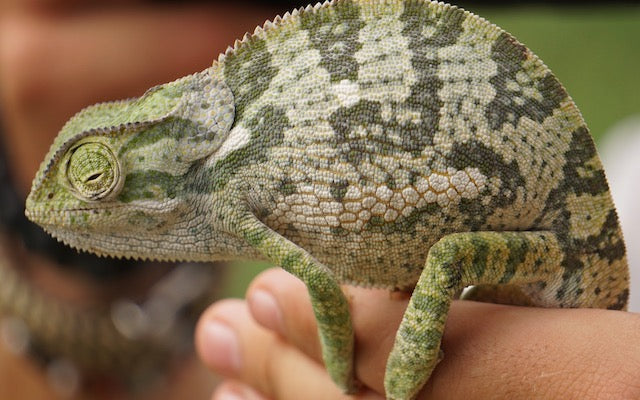Each chameleon keeper has their own reason for loving to keep Chameleons as pets.
Some keep chameleons as pets because they love watching their tongues dart out of their mouths to snatch up their prey during feeding time.
Others keep chameleons as pets because they’re fascinated by their color-changing abilities and want to observe the variety of colors their chameleon displays according to its moods.
Still others keep chameleons as pets simply because they enjoy observing these arboreal reptiles in their chameleon habitat, or they love the feeling of having a rainforest in their living room (or bedroom, or whichever room their keep their chameleon habitat in).
Regardless of your reasons for wanting to keep a pet chameleon, here are five things you should consider before committing your time and resources to these fascinating creatures.
Are Chameleons Good Pets?
You may be wondering: Are chameleons good pets? Unfortunately there’s no easy answer to that.
Whether or not keeping a pet chameleon is an enjoyable experience for you depends on what you’re looking for in a pet. If you enjoy “observation” pets like fish, snakes, and frogs, there’s a high probability you’ll enjoy keeping chameleons as pets. However, if you’re looking for a pet you can cuddle with and establish something of an emotional bond with, then a pet chameleon might not be the right choice for you.
Keeping chameleons as pets also might not be for you if you’re a little squeamish about bugs. Chameleons are insectivores, and as such rely on a steady diet of various live feeder insects like:
- Crickets
- Dubia roaches
- Grasshoppers
- Superworms
- Mealworms
- And more…
Many pet chameleon keepers end up establishing their own colonies of feeder insects so that they can control the quality of food they feed their chameleon. Other pet chameleon keepers prefer to purchase live feeder insects from a trusted vendor every month.
Pro Tip: Under no circumstances should you offer your chameleon dead, freeze dried, or dehydrated insects. Your chameleon will most likely reject such food. If it does eat it, such insects could cause health problems like impaction because of their lack of moisture.
Types of Chameleons: Choosing the Right Chameleon for You
Another important factor as you consider keeping chameleons as pets is which species of chameleons to keep.
Chameleons come in a wide variety of species, sizes, and colors. And, as you can imagine, each species of chameleon has its own unique needs. The best pet chameleon for you really depends on what unique features you’re looking for and how much time you want to commit to keeping chameleons as pets.
Some of the most popular pet chameleon species include:
- Jackson’s Chameleon
- Veiled Chameleon
- Panther Chameleon
- Carpet Chameleon
- Four-Horned Chameleon
- Parson’s Chameleon
- Pygmy Chameleon
Pro Tip: Since some species of chameleons are protected, be sure to ask for CITES paperwork on a chameleon you’re considering purchasing. This certifies that you are buying and owning this animal legally.
Chameleon Lifespan: How Long Will Your Chameleon Live?
Do you know how long you can expect your pet chameleon to live?
In general, smaller chameleon species tend to have shorter lifespans than their larger cousins. So if you’re wanting to have a pet chameleon that lives longer than six months to a year, you’ll likely want to avoid a species like the Pygmy Chameleon. And if you’re not yet sure you’re willing to dedicate up to 20 years to keeping a pet chameleon, then you might not want to purchase a Parson’s Chameleon.
That being said, here are the three most popular species of chameleons to keep as pets, along with their lifespans and average purchasing price:
Chameleon Lifespan & Price Chart
|
Chameleon Species |
Lifespan |
Average Price |
|---|---|---|
|
Jackson’s Chameleon |
3-5+ years |
$65–$150 |
|
Veiled Chameleon |
6-8+ years |
$30–$190 |
|
Panther Chameleon |
3-6+ years |
$130–$380 |
*View a more complete Chameleon Lifespan Chart in the article “How Long Do Chameleons Live?”

Chameleons for Sale: Where to Buy Your Pet Chameleon
Keeping chameleons as pets comes with the additional concern of responsibly sourcing where you purchase your pet chameleon.
Most pet stores import their chameleons – meaning they purchase wild-caught chameleons from a supplier. Before you completely dismiss importers, however, know that there are suppliers who responsibly and sustainably catch chameleons for export. If you decide to purchase an imported chameleon from your local pet store, be sure to book an appointment with your reptile or exotic pet veterinarian.
That being said, there are many chameleon breeders who sell healthy, responsibly bred chameleons as pets.
Your Chameleon Habitat
One final consideration to keep in mind as you’re deciding whether or not to keep chameleons as pets is what you’ll need to include in your chameleon’s habitat.
First of all, let’s look at how large your chameleon habitat needs to be. Bear in mind that chameleons are arboreal reptiles. As such, a chameleon habitat needs to be taller than most other reptile habitats. At the bare minimum, your chameleon’s habitat should be:
- 3’ long x 3’ deep x 4’ tall for larger species
- 18” long x 18” deep x 30” tall for smaller species
Considering that your chameleon habitat needs to be at least 4’ tall, you need to budget between 7’-8’ from floor to ceiling if you plan on putting your chameleon’s habitat on a tabletop or some other type of stand.
Your enclosure will also need:
- Light fixtures
- Heat fixtures
- Timers for both the light and heat fixtures
- Plants, vines and branches for your chameleon to climb on
- A misting system
- A dripper
- A temperature gauge
- A hygrometer for measuring humidity
Takeaway: Keeping chameleons as pets can be a big commitment. You’ll need to consider whether or not you’re ready to commit to keeping chameleons, what species of chameleon you’re interested in, how long you’d like to keep chameleons as pets, where you source your chameleons, and what you need to include in your chameleon habitat.
Your chameleon needs a wide variety of highly-nutritious, gut-loaded insects as the main staple of its diet. The Dubia roaches offered by Dragon’s Diet are a great start to keeping your chameleon well-nourished, happy, and living its best life.








